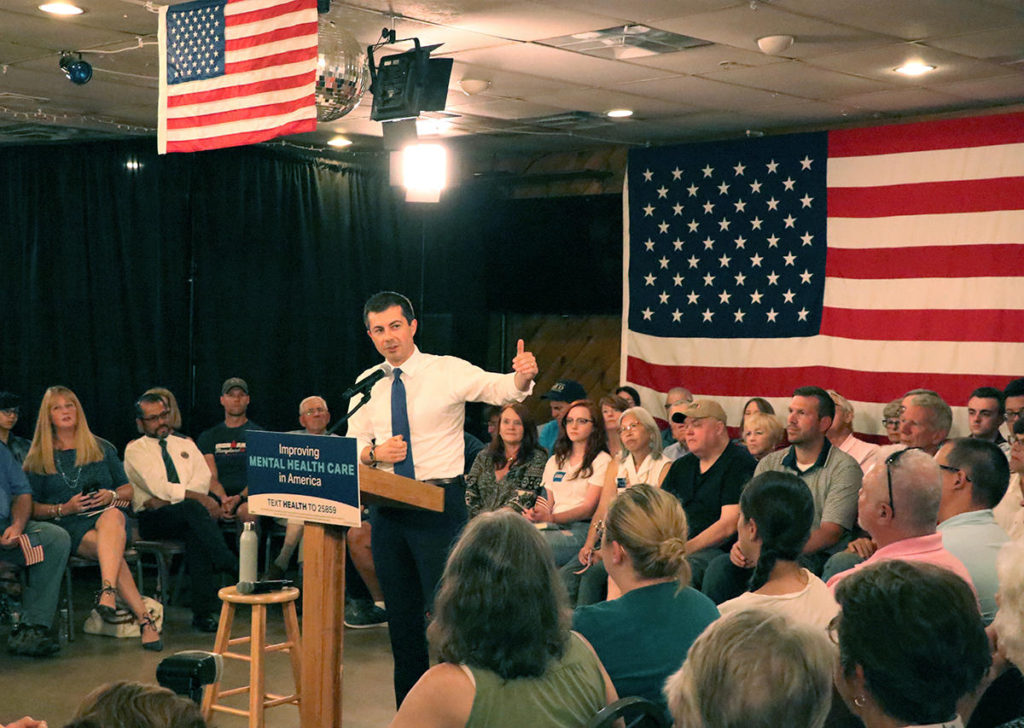
Friday
The Washington Post’s chief drama critic recently imagined South Bend mayor and presidential candidate Pete Buttigieg as a character in Thornton Wilder’s Our Town. Once again, a classic provides insight into a public figure.
As Peter Marks see it, Buttigieg’s “snug-fitting blue jeans,” his “white long-sleeve shirt folded neatly up to the elbows,” and his “genial decency” are reminiscent of Wilder’s play:
Standing before us on a platform in the middle of rolling farmland, his silhouette framed by a red barn draped with the stars and stripes, the candidate seems as if he could indeed be a figure conjured out of Wilder’s imagination: a pleasant fellow of homespun virtues, the sort who would leap to help a little old lady cross a street.
Marks notes the New Hampshire setting just happens to be Wilder’s setting as well. Both play and candidacy feature symbols that could appear in a Norman Rockwell painting. In addition, the bipartisan civility that Buttigieg preaches is characteristic of Our Town, where everyone more or less gets along. First, here’s Buttigieg:
“We just have to break the spell of people thinking that values belong to one political party,” because I’m not talking about conservative values. I’m talking about American values.”
And now the play:
In Our Town, Wilder professed a similar kind of ecumenical philosophy about civility, and civic life. A moment arises in the play when the narrator, the Stage Manager, calls upon the local newspaper editor, Mr. Webb, to enumerate some vital statistics about Grover’s Corners, pop. 2,642.
“We’re lower middle class: sprinkling of professional men … 10 percent illiterate laborers,” the editor reports, and goes on to break down the numbers of Republicans, Democrats and Socialists. “Religiously, we’re 85 percent Protestants; 12 percent Catholics; rest, indifferent.”
The point of the recitation is that numbers don’t tell you much, and percentages that might seem definitive don’t define the truth of shared experience in a small town.
Marks quotes another Wilder passage where editor Webb is asked whether there is any “culture or love of beauty in the community.” His answer is very Buttigiegian:
“No ma’am, there isn’t much culture,” Mr. Webb replies, “but maybe this is the place to tell you that we’ve got a lot of pleasures of a kind here. We like the sun comin’ up over the mountain in the morning and we all notice a good deal about the birds. We pay a lot of attention to them. And we watch the change of seasons, yes, everybody knows about them.”
Marks observes, “I can almost hear Mayor Pete saying something of the kind, to distill the character of his citizenry to simple plain-spoken aphorisms.”
Buttigieg may be small town in one sense but, unlike the character George—who foregoes college to take over his uncle’s farm—Mayor Pete left for bigger things: Harvard, Oxford, Afghanistan. He also left for a same sex marriage, which Wilder couldn’t have imagined. That being noted, however, he does have Wilder’s interest in the people he meets.
Marks describes the following tour of downtown, which he says could have shown up in a Wilder play:
In Lebanon, a city of about 14,000 just south of Dartmouth College, Buttigieg goes on a tour of downtown with some local officials, an event Wilder could have scripted. Over here is Scratch, the yarn store, where a bunch of women are gathered to knit; over on the other corner is the Salt Hill Pub, where New Hampshire residents Derry LaBombard and Claire Connolly show up to get the candidate’s signature on the requisite politician’s memoir, Shortest Way Home, published earlier this year. And then Buttigieg and a small scrum of reporters and staffers make their way to the fire station to greet the fire captain and a couple of Lebanon firefighters.
Mayor Pete knows this part of the script by heart. “How long are your shifts?” he asks the firefighters.
The intense interest that Buttigieg evinces in everyone he encounters is a major theme in Wilder’s play. Marks writes that the candidate has a “gaze of almost unsettling sincerity that he trains on an interlocutor,” and he observes,
His mayoralty, it seems, has taught him a kind of patient interest in everyone. His focus on a questioner, whether at a country fair or in a college gymnasium, is canine in its intensity.
This interest, however, is missing in Our Town, much to the distress of the recently deceased Emily, who returns to life to relive her 12th birthday. She is upset that people don’t pay attention to life as it slips by and flees back to the realm of the dead:
Emily: I didn’t realize. So all that was going on and we never noticed. Take me back up the hill to my grave. But first: Wait! One more look. Good-by, Good-by, world. Good-by, Grover’s Corners . . . Mama and Papa. Good-by to clocks ticking . . . and Mama’s sunflowers. And food and coffee. And new-ironed dresses and hot baths . . . and sleeping and waking up. Oh, earth, you’re too wonderful for anybody to realize you.
(She looks toward the stage manager and asks abruptly, through her tears:) Do any human beings ever realize life while they live it? every, every minute?
Stage Manager: No. (Pause.) The saints and poets, maybe they do some.
Buttigieg isn’t a saint but he does have something of the poet in him. His interest in life and in people does not seem feigned.